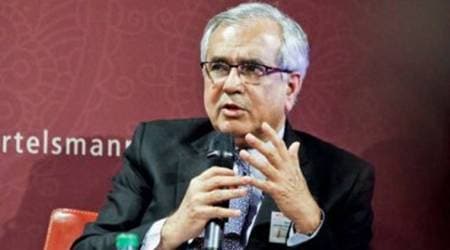 One of the mandates of the Niti Aayog is to build on the successes of the past 25 years as well as to prepare the country for the changing demands of a globalised economy.
One of the mandates of the Niti Aayog is to build on the successes of the past 25 years as well as to prepare the country for the changing demands of a globalised economy.
In February 2015, a month after the Niti Aayog was set up, a government document set out the new agency’s vision: “Today, we live in a global village, connected by modern transport, communications and media, and networked international markets and institutions. As India contributes to global dynamics, it is also influenced by happenings far removed from our borders. This continuing integration with the world needs to be incorporated into our policy-making as well as functioning of the government”. Two-and-a-half years later, the agency’s new vice-chairman, Rajiv Kumar, appears to be spelling out a rather different outlook. “A key transformation taking place on the policy-front in the current Central government led by Narendra Modi is that the colour of foreign influence, especially Anglo-American, on the Indian policy making establishment that came in the last few decades is fading away,” he wrote in a column in the Hindi daily Dainik Jagran, while referring to the resignation of his predecessor, Arvind Panagariya.
If the Niti Aayog’s 2015 document signaled a measure of welcome alacrity in responding to the imperatives of globalisation, its new vice-chairperson’s complaint against “imported experts” augurs an insularity unhealthy for the institution. In the article, in which he also questions the influence of multilateral institutions like the IMF and World Bank, Kumar talks of a new era in policymaking where “we may see experts being posted who understand India’s ground realities in a much better manner”. He cites the example of China which has always listened to the experience of the World Bank and the IMF but formulated its policies keeping in mind its goals and ground realities. Being informed about the complexities of local situations should, of course, be the bare-bones of all policymaking. But the assumption that only home-grown expertise can unravel such complexities — and its corollary, that exposure to foreign academia or global governance institutions is ipso facto pernicious — is deeply problematic. Kumar’s inferences about the IMF, World Bank and foreign universities hark back to conspiracy theories which should have been put to rest by the country’s successful tryst with globalisation.
One of the mandates of the Niti Aayog is to build on the successes of the past 25 years as well as to prepare the country for the changing demands of a globalised economy. Several of the government’s policies and imperatives — GST, Make in India, Swachh Bharat, Sustainable Development Goals, climate change targets — demand a sounding board that is informed and influenced by international best practices as well as alive to local necessities. The Niti Aayog’s vision document signaled its confidence to take on that role. But by invoking the phantom of the foreign hand, the Aayog’s new vice-chairman does his institution a disservice.






